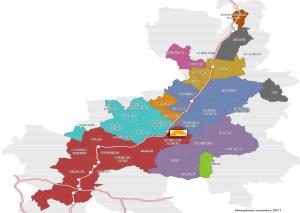Accommodating a workforce of 3,500
6 Jan 2012
-
Robert Arnoux
AIF has identified 41 towns and villages, most of them situated along the A51 thruway, that would be suitable for hosting ITER workers. Copyright: AIF
Activity on the ITER platform is already impressive: over the past year and a half—with no more than 300 workers on the site at any given time—the Tokamak Seismic Pit was created, the 257-metre long Poloidal Field Coils Building and ITER Headquarters erected, and most of the work on the four-hectare switchyard that will deliver power to the installation completed.
Now imagine how busy the place will become when construction of the Tokamak Complex, Assembly Hall and the other buildings begins. Imagine, also, the workforce required to assemble the machine ...
As early as the end of 2012, the number of workers on site will begin to rise, and it is projected that the 1,000 mark will be passed in late 2013. The plateau of 3,000-3,500 workers will be reached one year later. From then on, and for at least three years, the ITER platform will be extremely busy.
This is good news for ITER, and good news also for the region's economy. But how will the immediate region cope with such a large influx of population? Where will these workers—among whom 40 to 60 percent will come either from other French regions or from abroad—find a proper lodging?
Answering these questions is part of Agence Iter France's (AIF) mission. In cooperation with the European Domestic Agency Fusion For Energy, which is responsible for the construction of the ITER buildings, and in consultation with the ITER Organization, the French agency's Welcome Office is presently mapping out the local real estate market in order to assess its capacity to absorb the building contractors' demands.
Halfway into this assessment, to which AIF has associated a specialized consultancy firm and three relocation agencies, a mixed picture is emerging. "What is clear," says Emmanuelle Bellange, head of AIF's Welcome Office, "is that the current availability of housing within 30 minutes of ITER does not meet the demand that is anticipated. And rental prices are particularly high in this part of France..."
Solutions exist. But they have to be worked out with the local players. AIF has identified 41 towns and villages, most of them situated along the A51 thruway, that would be suitable for hosting ITER workers. AIF Director Jérôme Pamela, accompanied by Emmanuelle Bellange, has already met with the mayors of 31 of these 41 communities, explaining the challenges but also the potential benefits for local economies.
"Their reaction has been very positive," says Bellange. "The mayors are eager to welcome this new population and have ideas on how to do it. Some towns have real estate, like disaffected retirement homes or workers' hostels that—once renovated—could perfectly meet the contractors' needs; others have land that could host a base camp equipped with bungalows or mobile homes... The options are numerous."
A building contractor can, for instance, renovate a building, use it free of charge for the duration of its contract, and then retrocede it to the community. A mayor can trade the free use of a piece of municipal land for a base camp against the construction of a public soccer field. "It has to be a win-win operation," stresses Bellange.
"What everyone involved wants to avoid is the development of makeshift living areas, rent inflation and indecent living conditions for companies' employees."
There's even more at stake, however: the way the local inhabitants perceive the ITER Project as a whole will, in part, be linked to the impact of the workers' presence on their environment.


